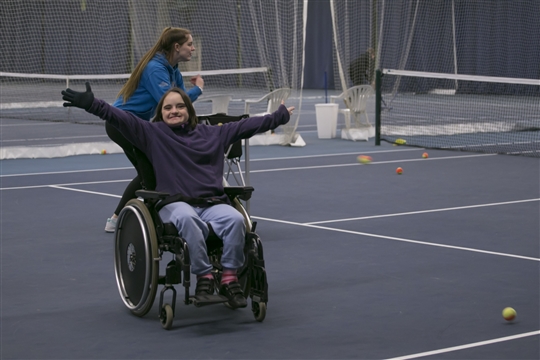By Coreen Henman
We’re lucky enough to have reached a point in time where technology has evolved and having a disability can be considered by many as a minor setback. There have been some incredible instances over the past few years which show that anything is possible if you put your mind to it, especially in sports....
The term ‘disability tennis’ is a general term that covers a range of impairments; deaf, learning disability, wheelchair and visually impaired. It is now standard procedure that tennis coaches have at least a basic understanding of these different impairments and have the skillset to adapt and deliver sessions accordingly.
Deaf Tennis – deaf people play full court, full ball tennis and a lot of deaf people integrate into mainstream sessions and activities. There are deaf specific sessions at some venues (Nottingham Tennis Centre hosts monthly camps). Clear communication between players, coaches and officials is essential. In deaf and hearing impaired competitions, players with hearing aids remove these to ensure an equal playing field. If you have a hearing impairment of 55 decibels or more in your best ear and a passion for tennis, you could be considered for the British Tennis deaf performance squads!
Visually Impaired Tennis (VI Tennis) – There are lots of opportunities for people who are blind or partially sighted to play – there are different categories for different levels of impairment. VI Tennis is usually played on a smaller court with a lower net and uses a sponge ball with a bell inside of it as an auditory cue. VI players can have up to 3 bounces depending on their category. Tactile lines and on court helpers can also be used in matches to help with positioning and scoring. There is a weekly session at Nottingham Tennis Centre every Friday 6-7pm.
Wheelchair Tennis – A really fun and challenging game to play and watch! Wheelchair players can play with non-disabled players on a full court with a full ball. The only rule change is that if you’re in a wheelchair, you’re allowed up to two bounces of the ball before returning it. Wheelchair tennis features a lot of the major tournaments and Grand Slams and we are lucky enough to have some world class players in the UK such as Jordanne Whiley, Gordon Reid and Alfie Hewett. Nottingham Tennis Centre hosts a weekly wheelchair session every Friday from 7-8pm as well as the British Wheelchair Open tournament in July.
Learning Disability Tennis (LD Tennis) - Tennis is the perfect game for anyone with a learning disability/difficulty. It can be adapted to suit any level of ability. We can make the court smaller, use bigger rackets or special balls designed to slow the game down and make it easier to play. Nottingham Tennis Centre run a weekly session on Fridays from 5-6pm.
The Tennis Foundation run world class programmes in wheelchair, deaf and learning disability tennis. They aim to “develop and support players with funding, coaching and expertise to compete at the highest level in their sport”, including the Paralympic games. Last year, the British Paralympians returned from Rio with a whopping 6 medals for tennis alone.
Paralympic Profiles
Gordon ‘Gio’ Reid
- Comes from a tennis oriented family, started playing at the age of six
- Contracted Transverse Myelitis in 2004 and started playing wheelchair tennis in 2005
- By 2006, he was shortlisted for the BBC Young Sports Personality of the Year
- Turned pro in 2012 when he attended the London Paralympics – reached quarter finals in both singles and doubles.
- Rio 2016 – won gold in men’s singles and silver in doubles with partner Alfie Hewitt.
- Currently ranks at world No.3 in singles and No.3 in doubles (has previously reached top spot in both).
Jordanne Whiley
- Like her dad Keith, a Paralympian who won bronze in New York, Jordanne has osteogenesis imperfecta (aka brittle bone disease)
- At the ripe age of 14 she became the youngest ever British singles champion in wheelchair tennis.
- In 2012, she made the Wimbledon doubles finals before heading to the London Paralympics and winning a bronze medal alongside Lucy Shuker.
- Rio 2016 – Whiley and Schuker bagged themselves another bronze.
Of course these players didn’t just end up at the Paralympics, they had to put in a lot of time and effort to get to where they did and they didn’t let anything stop them. If you have a disability and would like to get involved in tennis, there’s no better time to start than now. Nottingham offers sessions for a range of disabilities, so there’s no excuse not to get involved!
Check out this page for more information: http://www.nottinghamcity.gov.uk/adultstennis#Disability%20Activities

